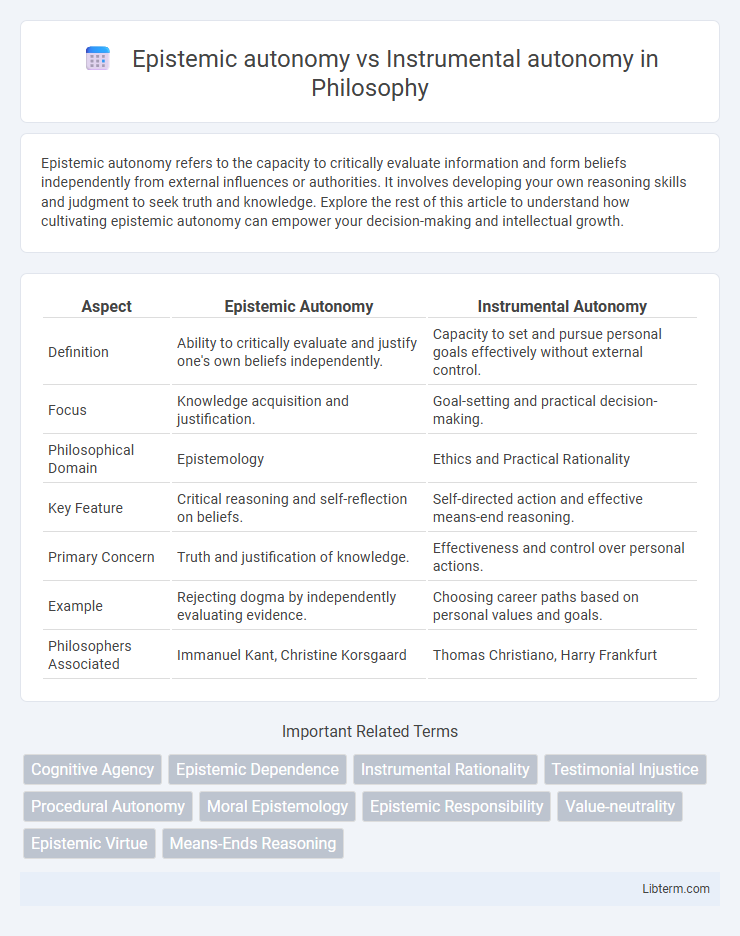Epistemic autonomy refers to the capacity to critically evaluate information and form beliefs independently from external influences or authorities. It involves developing your own reasoning skills and judgment to seek truth and knowledge. Explore the rest of this article to understand how cultivating epistemic autonomy can empower your decision-making and intellectual growth.
Table of Comparison
| Aspect | Epistemic Autonomy | Instrumental Autonomy |
|---|---|---|
| Definition | Ability to critically evaluate and justify one's own beliefs independently. | Capacity to set and pursue personal goals effectively without external control. |
| Focus | Knowledge acquisition and justification. | Goal-setting and practical decision-making. |
| Philosophical Domain | Epistemology | Ethics and Practical Rationality |
| Key Feature | Critical reasoning and self-reflection on beliefs. | Self-directed action and effective means-end reasoning. |
| Primary Concern | Truth and justification of knowledge. | Effectiveness and control over personal actions. |
| Example | Rejecting dogma by independently evaluating evidence. | Choosing career paths based on personal values and goals. |
| Philosophers Associated | Immanuel Kant, Christine Korsgaard | Thomas Christiano, Harry Frankfurt |
Defining Epistemic Autonomy
Epistemic autonomy refers to the capacity of individuals or agents to critically evaluate information, form independent judgments, and generate knowledge grounded in their own reasoning processes. It contrasts with instrumental autonomy, which emphasizes the ability to effectively use tools or means to achieve specific goals without necessarily engaging in critical reflection. Defining epistemic autonomy involves recognizing the ethical and cognitive dimensions of self-governed inquiry, underscoring the importance of intellectual self-determination in acquiring and validating knowledge.
Understanding Instrumental Autonomy
Instrumental autonomy refers to the ability to effectively use tools, methods, and strategies to achieve specific goals or solve problems, emphasizing practical competence and control over external resources. This form of autonomy highlights the capacity to select and apply instruments or techniques adaptively, enhancing efficiency and goal attainment. Understanding instrumental autonomy involves recognizing how individuals or systems manage resources and processes to influence outcomes in a targeted, goal-oriented manner.
Historical Context and Philosophical Roots
Epistemic autonomy, rooted in Enlightenment philosophy, emphasizes the individual's capacity to reason independently and acquire knowledge without external authority, drawing from Immanuel Kant's advocacy for intellectual self-governance. Instrumental autonomy traces back to practical philosophy and social contract theories, particularly influenced by John Locke and Thomas Hobbes, highlighting autonomy as the ability to make decisions and act based on external goals or tools for navigating social structures. Historically, the tension between these forms of autonomy reflects broader debates on sovereignty, individual rights, and the limits of rational agency in both personal and political realms.
Key Distinctions Between Epistemic and Instrumental Autonomy
Epistemic autonomy involves the capacity to form beliefs and knowledge based on independent reasoning and critical thinking, emphasizing intellectual self-governance and authenticity. Instrumental autonomy refers to the ability to make decisions and take actions to achieve practical goals, focusing on effective control and goal-directed behavior. Key distinctions lie in epistemic autonomy prioritizing truth-seeking and justification, whereas instrumental autonomy centers on outcome optimization and strategic planning.
Autonomy in Knowledge Acquisition
Epistemic autonomy refers to the capacity to critically evaluate, question, and form independent judgments in the process of acquiring knowledge, emphasizing the role of self-directed reasoning and cognitive independence. Instrumental autonomy focuses on the ability to effectively use tools, methods, and external resources to achieve specific knowledge goals, highlighting practical competence in problem-solving. In knowledge acquisition, fostering epistemic autonomy ensures genuine understanding and critical reflection, while instrumental autonomy enhances the efficiency and applicability of learning processes.
Instrumental Autonomy in Decision-Making
Instrumental autonomy in decision-making emphasizes the capacity to effectively select and implement actions based on desired outcomes and external constraints, prioritizing practical efficiency over self-generated beliefs. This form of autonomy relies heavily on applying available information and resources to optimize decisions, often integrating tools, algorithms, or predefined strategies. Unlike epistemic autonomy, which centers on independent knowledge acquisition and understanding, instrumental autonomy is concerned with functional control and goal-directed behavior within decision-making processes.
Implications for Education and Learning
Epistemic autonomy emphasizes developing learners' critical thinking and independent knowledge construction, fostering deep understanding and lifelong learning skills. Instrumental autonomy prioritizes practical skills and goal-oriented problem solving, preparing students to efficiently apply knowledge in real-world contexts. Educational strategies integrating both forms promote balanced cognitive growth by enhancing conceptual reasoning alongside adaptive, task-specific competencies.
Autonomy in Technology and Artificial Intelligence
Epistemic autonomy in technology and artificial intelligence refers to the system's capacity to generate, evaluate, and update knowledge independently without relying on external inputs or human intervention, enhancing decision-making accuracy and adaptability. Instrumental autonomy emphasizes the system's ability to perform tasks and achieve goals efficiently through automated processes, focusing on practical functionality rather than independent reasoning. Balancing epistemic and instrumental autonomy in AI development is crucial for creating systems that are both reliable in knowledge management and effective in task execution.
Challenges and Criticisms of Both Forms
Epistemic autonomy faces challenges related to epistemic humility and the risk of subjective bias, as individuals may overestimate their capacity for independent knowledge acquisition without external validation. Instrumental autonomy encounters criticisms regarding its potential to prioritize efficiency and external goals over genuine understanding, leading to mechanistic decision-making detached from ethical or reflective considerations. Both forms struggle with balancing independence and collaborative input, raising epistemological and practical concerns about maintaining autonomy without sacrificing accuracy or social responsibility.
Balancing Epistemic and Instrumental Autonomy in Practice
Balancing epistemic and instrumental autonomy requires recognizing the value of independent knowledge pursuit alongside practical goal achievement. Effective decision-making integrates critical thinking and evidence evaluation with strategic actions aimed at desired outcomes. Organizations and individuals enhance innovation and adaptability by fostering environments where both autonomous inquiry and goal-oriented behavior coexist.
Epistemic autonomy Infographic

 libterm.com
libterm.com